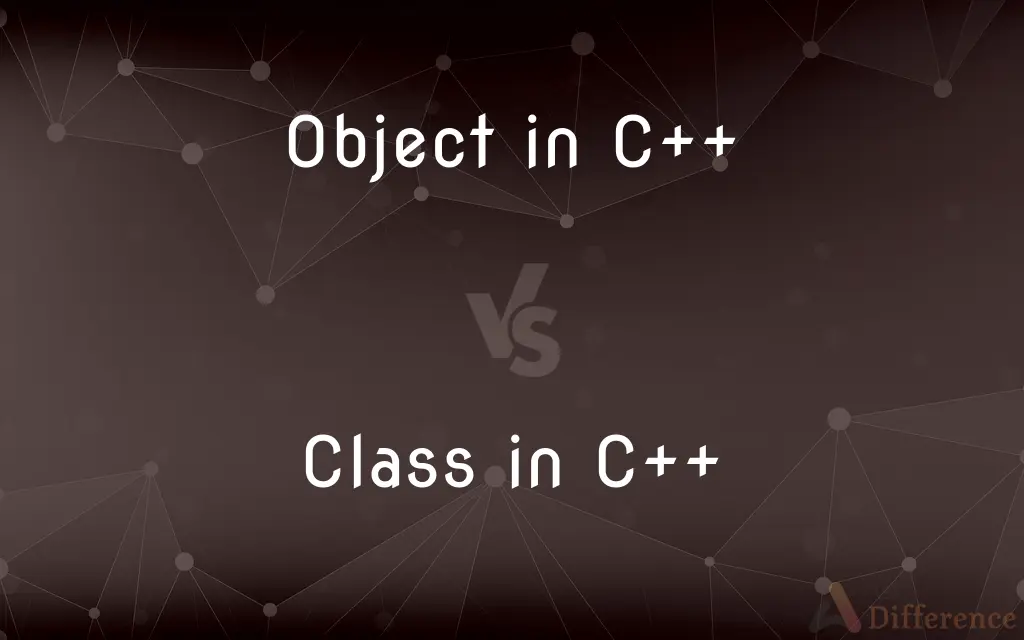Object in C++ vs. Class in C++ — What's the Difference?
By Tayyaba Rehman & Urooj Arif — Published on February 5, 2024
An Object in C++ is an instance of a Class, representing an entity with data and functions, while a Class is a blueprint defining the data structure and behaviors of its Objects.

Difference Between Object in C++ and Class in C++
Table of Contents
ADVERTISEMENT
Key Differences
An Object in C++ is a real-time representation of a Class. It encapsulates data and functions. A Class in C++ is a user-defined data type that serves as a blueprint for creating Objects.
Objects in C++ are created from a Class and possess the properties and functions defined in the Class. Classes in C++, on the other hand, do not occupy any memory until an Object of their type is created.
An Object in C++ is an instance with a distinct identity, having its own set of values for its attributes. A Class in C++ outlines the structure and behavior common to all Objects of that Class.
Objects in C++ can interact and communicate with other Objects, using their methods and properties. Classes in C++, while defining these methods and properties, do not interact directly.
In C++, an Object has a lifespan; it is created and eventually destroyed. A Class in C++ exists throughout the program and is not subject to creation or destruction in the same way as an Object.
ADVERTISEMENT
Comparison Chart
Definition
An instance of a Class
A blueprint or template for creating Objects
Memory Usage
Occupies memory when instantiated
Does not occupy memory itself
Role
Represents real entities with data and behaviors
Defines the structure and behavior of Objects
Interaction
Can interact with other Objects
Does not interact directly
Lifespan
Created and destroyed during program execution
Exists throughout the program’s life
Compare with Definitions
Object in C++
An Object in C++ represents a real-world entity.
In the simulation, each animalObject represents an individual animal.
Class in C++
A Class in C++ is a template for creating Objects.
The Car Class defines the common attributes of all car Objects.
Object in C++
An Object has a unique identity in C++.
Each buttonObject on the screen has its own properties and behaviors.
Class in C++
A Class encapsulates data and functions in C++.
The UserInterface Class encapsulates all UI-related elements and functionalities.
Object in C++
An Object encapsulates data and methods defined in its Class.
EmployeeObject accesses its salary attribute and displaySalary() method.
Class in C++
A Class in C++ is a user-defined data type.
I created a Book Class to handle all functions related to book management.
Object in C++
An Object is an instance of a Class in C++.
CarObject in the program is an Object of the Car Class.
Class in C++
A Class defines the properties and behaviors of its Objects.
The Employee Class includes data like name and salary, and methods like calculateBonus().
Object in C++
Objects in C++ are created and destroyed dynamically.
When the function ends, the local studentObject is automatically destroyed.
Class in C++
Classes in C++ form the basis for Object-Oriented Programming.
Our software's architecture is built using various interconnected Classes.
Common Curiosities
How is an Object created in C++?
An Object in C++ is created using the constructor of a Class.
Do Objects in C++ share class methods?
Yes, Objects in C++ share methods defined in their Class.
What is a Class in C++?
A Class in C++ is a blueprint or template that defines the structure and behaviors for Objects.
What is an Object in C++?
An Object in C++ is an instance of a Class, representing a specific entity with data and behaviors.
Can a Class in C++ create an Object?
A Class itself doesn’t create an Object but defines how Objects are structured and behave.
How many Objects can be created from a Class in C++?
There is no limit to the number of Objects that can be created from a Class in C++.
Can a Class in C++ inherit from another Class?
Yes, Classes in C++ can inherit from other Classes, known as base Classes.
Can a Class in C++ have private members?
Yes, a Class in C++ can have private members that are not accessible outside the Class.
Are all members of a Class in C++ shared by its Objects?
No, static members are shared, but non-static members are specific to each Object.
Can a Class in C++ exist without an Object?
Yes, a Class can exist without creating any Objects.
Is a Class in C++ a data type?
Yes, a Class in C++ is considered a user-defined data type.
Can Objects in C++ have different values for the same property?
Yes, each Object in C++ can have unique values for its properties.
What happens to an Object in C++ when it goes out of scope?
The Object is destroyed and its memory is deallocated.
How are Objects in C++ passed to functions?
Objects in C++ can be passed to functions by value, reference, or as pointers.
Can we modify an Object in C++ after it's created?
Yes, the state of an Object in C++ can be modified after its creation, unless it's declared as const.
Share Your Discovery

Previous Comparison
NFC vs. AFC
Next Comparison
Vodka vs. BrandyAuthor Spotlight
Written by
Tayyaba RehmanTayyaba Rehman is a distinguished writer, currently serving as a primary contributor to askdifference.com. As a researcher in semantics and etymology, Tayyaba's passion for the complexity of languages and their distinctions has found a perfect home on the platform. Tayyaba delves into the intricacies of language, distinguishing between commonly confused words and phrases, thereby providing clarity for readers worldwide.
Co-written by
Urooj ArifUrooj is a skilled content writer at Ask Difference, known for her exceptional ability to simplify complex topics into engaging and informative content. With a passion for research and a flair for clear, concise writing, she consistently delivers articles that resonate with our diverse audience.
















































